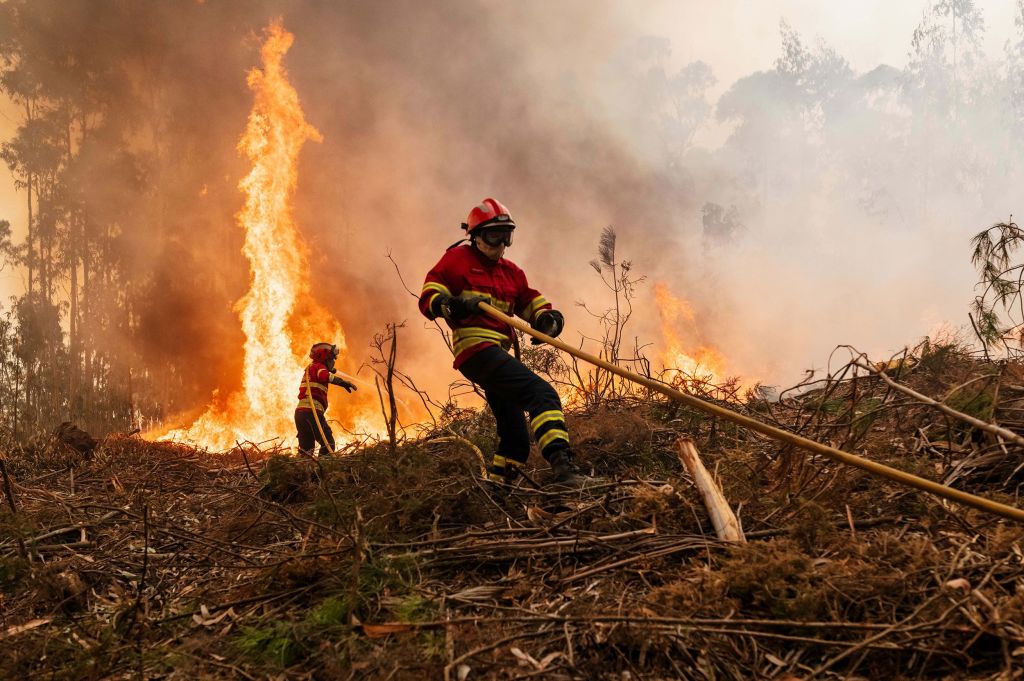
By Vasco Cotovio | CNN
Lisbon — For three days in mid-September, wildfires rapidly tore through parts of Portugal, turning the sky a hellish, smoky red against the rolling green hills in the north. In central Portugal, a blaze engulfed a highway, cutting off the top half of the country from the bottom. Nine people were killed.
Few people in other parts of Europe and the US would have realized that some of their everyday products may have played a role in making these fires worse. Certain toilet paper, tissue and office paper brands are made with materials from eucalyptus trees, a non-native species to Portugal.
The eucalyptus globulus — also known as the Tasmanian blue gum — is an ideal tree for commercial cultivation because it’s faster-growing, has a larger amount of fiber and produces more pulp than most other species. That means it can be made into high-quality paper and tissue in an efficient and economical way.
The problem is eucalyptus trees are particularly flammable. That’s especially dangerous as the planet heats up from nearly two centuries of humans burning fossil fuels at an industrial scale.
The eucalyptus tree is native to Australia and provides food and shelter to koalas, among other wildlife. It has spread rapidly in other countries, too, including Portugal, where it was introduced in the early 19th century.
As the Portuguese paper and timber industries grew in the mid-1900s, so too did eucalyptus plantations, and the species now covers nearly 2 million acres. That’s almost one-tenth of the entire country, and a quarter of its total forested area.
RELATED: Eucalyptus are one of the state’s most controversial trees. A Monterey Bay reserve may be a model for how to replace them.
Proportional to its size, Portugal has more eucalyptus than any country in the world. Miles and miles of the trees blanket the landscape like “green deserts,” as some Portuguese say. But it’s not the only nation to allow the species’ spread. In California, the eucalyptus tree has been naturalized, meaning it now grows beyond the places it was planted.
A debate over the role of eucalyptus in wildfires in both California and Portugal is brewing, with some studies showing they have little influence in making blazes worse. Yet some experts warn these trees — especially their bark, twigs and leaves — are more flammable than other species. In California, the National Park Service manages the trees as fire hazards.
A Portuguese environmental group called Quercus — the scientific name for the oak tree — wants to dial back the spread of eucalyptus trees and encourage more growth of the native oak.
Domingos Patacho, a forest engineer with Quercus, said one of the reasons eucalyptus trees are so flammable is because their leaves and branches decompose very slowly in Portuguese soil, which hasn’t adapted to the species, leaving kindling lying on the forest floor.
Wildfires burning eucalyptus spread more quickly and jump more easily to other areas, he said.
“It has a split bark which releases itself, catches fire and then is projected over large distances,” Patacho told CNN.
These incandescent bits of eucalyptus bark are carried by the wind — sometimes over several miles — and can create “secondary ignitions” and open up other fronts, outmaneuvering firefighters, he said.
Northwestern Portugal also has other factors working against it when it comes to increasing fire risk, said Henrique Pereira dos Santos, a Portuguese landscape architect.
Unlike parts of Greece and Italy, for example, where scorching summers mean weeds and other plants that can fuel fires tend to grow slowly, northwestern Portugal, with its proximity to the Atlantic ocean, remains cooler and more humid — ideal growing conditions for this kind of vegetation, de Santos said. And natural fire fuels that usually stop growing during cold seasons in places like Finland continue to bloom in Portugal’s mild winter.
“We have a combination of poor soils, unfavorable topography and a climate that favors the accumulation of fine fuels,” he said, referring to grasses, twigs, leaves or needles that can ignite easily when dry.
A town transformed
The central-western Portuguese town of Albergaria-a-Velha was among the worst hit by the September fires, as swaths of the forest and eucalyptus plantations around it went up in flames.
The town’s name is derived from the Portuguese word for “guesthouse” and it historically welcomed pilgrims traveling through the Iberian Peninsula. But in September, it became inhospitable, even deadly, as the fires around it spread into the town and consumed houses and businesses.
Four people were killed and at least 40 families were left homeless as the fire consumed more than 21,000 hectares of land in the town.
Some small landholders in the area sell their eucalyptus wood through a cooperative called the Lower Vouga Forestry Association. Most of it goes to the Navigator Company, a Portugal-based international pulp and paper corporation.

















































